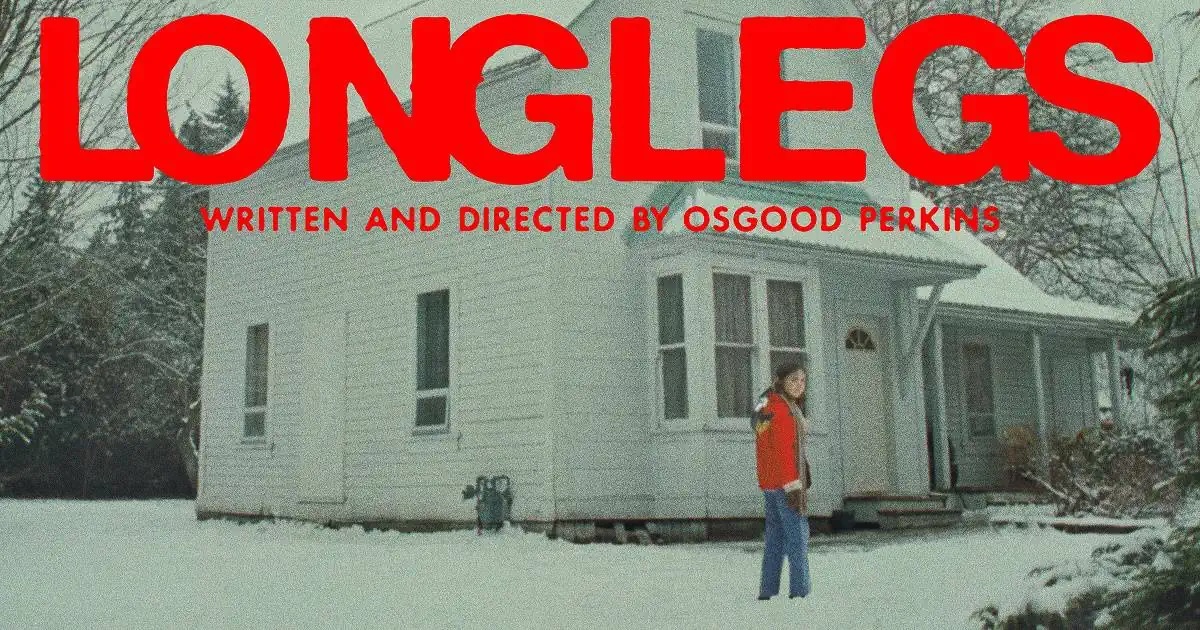Longlegs ~ Review

The opening shot of Longlegs is from the passenger’s seat of a car as it slowly drives through a snowy Oregon back road toward a white house. The camera is at a canted angle and is in a 4:3 aspect ratio. Everything is just slightly off and more than a little claustrophobic. This shot lasts, a minute at most, but it made me so anxious and unnerved before the movie even began! And the next 100 minutes only elevated my anxiety, that I needed to take a walk after the film ended to get my heart rate back to normal.
To say any more would venture into spoiler territory and this is a film that must be seen with as little context as possible. So, here’s my recommendation: Longlegs is a fantastic, harrowing film. It is exceptionally well-directed, written, and performed…and I will never see it again. If you want more context read on – otherwise be warned, spoilers are ahead!
It's the mid-1990s and in rural Oregon, a decades-long string of brutal murder-suicides involving families has left the FBI completely stumped. In each incident, a father has murdered his family and then killed himself. The only clue that horrific crimes could be committed by someone else is that a note written in a strange Satanic code and signed “Longlegs,” has been left at the crime scenes.
With nowhere else to turn, lead investigator Carter (Blair Underwood) turns to special agent Lee Harker (Maika Monroe), a vaguely psychic field agent, to help solve the case. Carter quickly puts together patterns in each crime scene. Every family had a daughter whose birthday fell on the 14th of the month and the murders happened six days before or after the date. It becomes clear that this is the work of a serial killer (Nicolas Cage), and that there might be something supernatural going on. Furthermore, it also appears that Harker and her mother (Alicia Witt) might have a connection to the killer.
As I said, Longlegs freaked me out. Between Nicolas Cage’s truly creepy and unhinged performance and writer/director Oz Perkins’ moody direction, the film feels like watching a nightmare. And like a nightmare where you can’t pinpoint exactly what’s wrong, everything here feels slightly off. For much of the film, Perkins puts his actors (particularly Lee) in the center of the frame, which gives the feeling of isolation. This makes sense for Maika Monroe’s character as she struggles to connect with people, but for the film at large, it overwhelms the viewer with this feeling of dread – like nowhere is safe. The investigation doesn’t make one hundred percent logical sense, but this is all by design. Like a nightmare, images and moments are strung together by mood, more than anything else.
Maika Monroe is fantastic as Lee Harker. The film never spells out whether or not she is on the autism spectrum, but Monroe plays her nervous darting eyes, and inability to give eye contact with such warmth and pathos. And despite being a character who is isolated from other people, it is clear that she does have a depth of empathy. It’s always great to see the underappreciated Alicia Witt show up in anything and here she gives a nuanced performance of someone dealing with deep-held trauma. Blair Underwood brings a world-weary energy to the film, desperately trying to cling to his family life while keeping the horror of his job separate. Kiernan Shipka shows up as a creepy mental patient too who speaks in a sing-songy childish patois that is particularly unnerving.
It might be too soon to call Longlegs a new classic, but screw it, I think it is! The film is destined to stand alongside the likes of The Silence of the Lambs or The Shining -- movies that will scare the pants off of you long after they end. As I was brushing my teeth last night an image from the film crept through my mind, sending shivers down my spine – that’s how you know a film has an impact.
Four out of Four Stars
 WhoRepresents.com is safe & secure
WhoRepresents.com is safe & secure